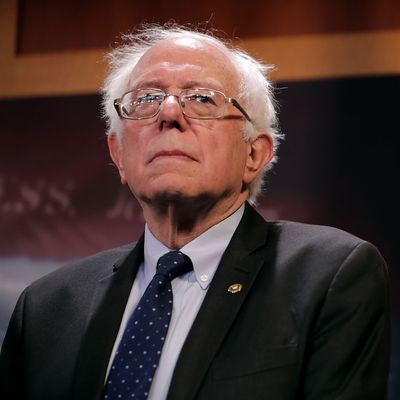
Senator Bernie Sanders confirmed today that he will run for reelection in the Senate next year as an independent.
“I am an independent and I have always run in Vermont as an independent, while I caucus with the Democrats in the United States Senate. That’s what I’ve been doing for a long time and that’s what I’ll continue to do,” Sanders told Fox News.
Sanders is not exaggerating when he says he been running in Vermont as something other than a Democrat for “a long time.” Best I can tell, his first race for office was 45 years ago, when he ran for governor of Vermont as the Liberty Union Party candidate. Next year will mark his 20th campaign in Vermont, and his 16th as an independent. He has never run there as a Democrat. So in refusing to do so in 2018, he is simply not dancing with the one who didn’t bring him to the hoedown.
Speaking of dancing, when pursuing the 2016 Democratic presidential nominating contest, Sanders occasionally had to certify himself as a Democrat — notably in the first primary, in New Hampshire (in his own state, there is no voter registration by party). But he never disclaimed his independent-but-caucusing-with-Democrats status in the Senate.
Sanders’s party affiliation decision is a little more interesting because of a resolution offered at the DNC meeting in Las Vegas last weekend. It called on self-identified independent senators who caucus with the party (a category that includes just two people, Sanders and Maine’s Angus King) to become loud ‘n’ proud Democrats. It didn’t make it out of the Resolutions Committee, but inquiring minds still wanted to know what Sanders would do.
Some pundits figured Sanders would formally become a Democrat if he had any interest in running for president again in 2020. And had he reclassified himself once and for all, there’s no question 2020 speculation about a Return of the Bern would have been ratcheted up to a fever pitch.
But if he really hasn’t decided about 2020 one way or the other, it would make more sense for him to do what he’s always done and rock no boats.
It’s an interesting question as to whether actual Democratic voters — a class that includes many self-identified independents, even if they don’t behave “independently” at all — really care whether their candidates formally identify with the Donkey Party.
Near the end of the 2016 primaries, Ron Brownstein estimated that about three-fourths of the participants in states where there were primaries and exit polls self-identified as Democrats while one-fourth self-identified as independents or Republicans. Sanders won among the non-self-identifying-Democrats about two-to-one and lost among the self-identifying Democrats by about the same margin (he did better in the caucuses that were not part of Brownstein’s sample). There was a lot of angst expressed by Sanders supporters at the time about the “rigged” nature of the process insofar as many states didn’t let registered independents vote in Democratic primaries, and/or made it hard to re-register as Democrats at the last minute.
That was never the most compelling argument (such decisions about the rules are made well in advance of any particular contest by state legislatures, a majority of which are currently controlled by Republicans, not by the “Democratic Establishment”), but overall Sanders probably benefitted from his identification with the cause of open primaries more than he suffered from any suspicion of being an outsider. In any event, breaking the very firm pattern of his lifelong aversion to identifying as a Democrat would have raised more questions than it would have answered.






























